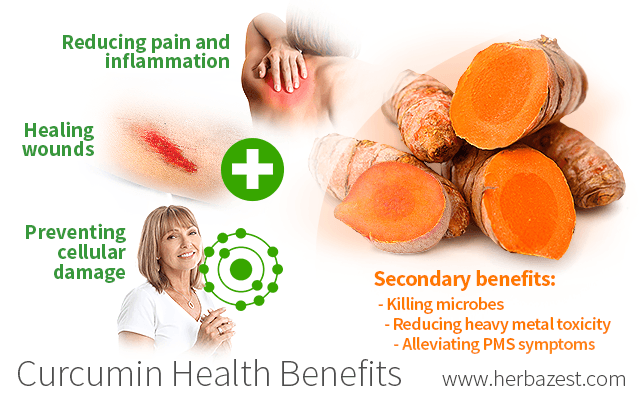The powerhouse of turmeric's medicinal action, curcumin benefits human health in a myriad of ways.
Main Benefits of Curcumin
- Preventing cellular damage. Oxidative stress has been implicated in a number of different illnesses, such as diabetes, rheumatoid arthritis, and some cardiovascular diseases. Luckily, one of the most important benefits of curcumin is its antioxidant effect.
A study investigated the air oxidation of linoleic acid and found turmeric's antioxidant abilities to be comparable to that of vitamins C and E.1
- Healing wounds. In numerous studies, curcumin's anti-inflammatory effects have been shown to work in conjunction with its antioxidant action to improve the body's natural ability to recover from injuries.
Another study observed the re-epithelialization and migration of epidermal cells in rats and guinea pigs and found that curcumin-treated subjects showed faster wound closure when compared to the untreated control group.2
Secondary Benefits of Curcumin
- Killing microbes. Numerous studies on antimicrobial activity of curcumin have been performed, and many more are ongoing.
A review on curcumin's antibacterial, antiviral, and antifungal properties found that curcumin has the most promising effects against Helicobacter pylori bacteria and may be useful in conjunction with other medicines to help decrease gastritis symptoms.3 Meanwhile, further studies are required to fully evaluate the antifungal activity of curcumin on Candida species and Paracoccidioides brasiliensis.
- Reducing heavy metal toxicity. Curcumin has been shown to prevent toxicity from arsenic, lead, copper, and mercury, among other substances. A study published in 2014 suggests that this may be due to the hepatoprotective properties of curcumin, though further research is needed to prove its role in preventing heavy metal-related liver damage.4
- Alleviating PMS symptoms. Long used in traditional medicine as a treatment for symptoms related to premenstrual syndrome (PMS), turmeric is finally being scientifically recognized for its healing benefits for women.
In a randomized, double-blind, placebo-controlled trial, 70 women were treated with curcumin capsules in the days leading up to their period.5 Findings suggest that curcumin was significantly more effective in lowering physical symptoms of PMS as compared to the control group. Mood and behavior, however, did not vary much.
Unconfirmed Benefits of Curcumin
- Preventing uncontrolled endometrial growth. Studies show that curcumin or turmeric consumption may inhibit the spread of malignant cells in the body. In 2009, for example, a study concluded that curcumin was shown to thwart endometriosis in animals by inhibiting the growth of new blood vessels.6
Although curcumin's antiangiogenic properties form the basis of theories about it as a potential anticancer ally, studies on curcumin's effects on cancer have been largely inconclusive and contradictory, with sometimes counterproductive effects that discourage the use of curcumin before further evidence is gathered to ensure its safety.
- Improving cognitive function. Antioxidant curcumin lowers lipid peroxides, which are thought to be the source of aging and neurodegeneration. However, scientific research on curcumin's benefits for Alzheimer's disease (AD) and other similar diseases has not been consistent.
While curcumin inhibits certain key molecules involved in AD and is capable of crossing the blood-brain barrier in animal models, a trial published in 2008 suggests that curcumin supplements may be ineffective in the improvement of cognitive performance in AD patients.7
Curcumin benefits the human body in a number of important ways. Thanks to its anti-inflammatory, antioxidant, and hepatoprotective actions, it is the true source of turmeric's wonderful health benefits.
Sources
- CNS Neuroscience & Therapeutics, Curcumin and Alzheimer’s Disease, 2010
- International Journal of Cancer, The Dark Side of Curcumin, 2009
- Life Sciences, Multiple biological activities of curcumin, 2006
- Oregon State University, Micronutrient Information Center
Footnotes:
- Chemical & Pharmaceutical Bulletin. (1985). Natural Antioxidants. III. Antioxidative components isolated from rhizome of Curcuma longa L. Retrieved September 23, 2021, from: https://pubmed.ncbi.nlm.nih.gov/4042250/
- Wound Repair and Regeneration. (1998). Enhancement of wound healing by curcumin in animals. Retrieved September 23, 2021, from: https://pubmed.ncbi.nlm.nih.gov/9776860/
- BioMed Research International. (2014). A Review on antibacterial, antiviral, and antifungal activity of curcumin. Retrieved September 23, 2021, from: https://www.hindawi.com/journals/bmri/2014/186864/
- Food and Chemical Toxicology. (2014). Protective effect of curcumin against heavy metals-induced liver damage. Retrieved September 23, 2021, from: https://pubmed.ncbi.nlm.nih.gov/24751969/
- Complementary Therapeutic Medicine. (2015). Curcumin attenuates severity of premenstrual syndrome symptoms: A randomized, double-blind, placebo-controlled trial. Retrieved September 23, 2021, from: https://pubmed.ncbi.nlm.nih.gov/26051565/
- Indian Journal of Biochemistry and Biophysics. (2009). Curcumin arrests endometriosis by downregulation of matrix metalloproteinase-9 activity. Retrieved September 23, 2021, from: https://pubmed.ncbi.nlm.nih.gov/19374255/
- Journal of Clinical Psychopharmacology. (2008). Six-month randomized, placebo-controlled, double-blind, pilot clinical trial of curcumin in patients with Alzheimer disease. Retrieved September 23, 2021, from: https://pubmed.ncbi.nlm.nih.gov/18204357/




